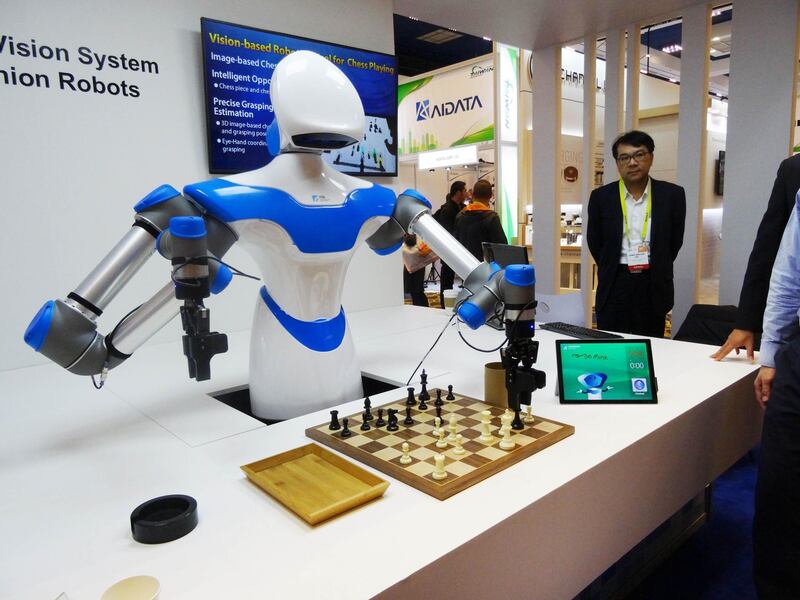According to technological singularity – the theory that artificial intelligence will lead to runaway changes to society – machines will make such massive progress that they will eventually be smarter than human beings. It defines the moment when robots could take over, and it is nearer than we think. Google's head of artificial intelligence, Ray Kurzweil, thinks robots could match human intelligence in as little as 11 years' time.
An ex-Google executive called Anthony Levandowski has already installed himself as the leader of a new "religion" called The Way of the Future, which, in the moment of singularity, will focus on "the realisation, acceptance and worship of a godhead based on artificial intelligence developed through computer hardware and software".
It is not the first time humans have worshipped non-human entities. The Sun, the Moon and other natural phenomena have long been the subject of worship. But so, too, have human beings' own creations: statues, man-made deities and temples have all been built and worshipped. Yet for the first time, creations made by human beings will be able to do more than just stand there mutely. In many ways, they will be far superior to their creators.
So the question: “Could artificial intelligence one day be considered a god?” is not intended to be blasphemous but rather, opens the door to examine bigger issues that have troubled human beings throughout our existence – questions about humanity, the stuff of consciousness and the divine.
In today’s world, we are struggling with an interesting religious divide. In some regions like the United States and Europe, religion has been in steep decline, but there are also populations which have become increasingly devotional. The arrival of artificial intelligence will challenge those positions, perhaps entrenching them, perhaps opening new avenues of conversation.
In a way, questions about whether robots can truly become human, whether they are potential deities or just a further iteration of the human industrial revolution are still largely the realm of futurologists, sci-fi authors and tweed-jacketed philosophy professors.
What is far more pertinent is the impact that AI could have on our practical experiences of religion, ideology and social mores. Intelligent robots can already be quite human-like so it’s not a stretch to imagine they could offer insightful religious sermons, perhaps even conducting weddings and funerals.
When it comes to delivering religious edicts, AI could provide a comprehensive grasp of religious texts, their authenticity and the interrelationships between different holy books. You could argue that they could even potentially remove the bias of the interpreter to provide a more universal and objective analysis, independent of an individual's own experience. If we already have health bots that respond online to offer medical diagnoses, why not imam-bots delivering religious guidance? And could priest-bots one day take confession for Catholics?
Perhaps you could even purchase your own conscience-bot to peer over your shoulder and poke you in the ribs every time you are about to do something wrong. AI is already being developed to detect lying, so in the not-too-distant future, bad-thought-bots could give you a minor electric shock for even thinking sinfully.
________________
Read more on artificial intelligence:
[ Artificial intelligence can help humanity, says new AI minister ]
[ We can ensure that AI remains a force for good ]
[ Will the coming AI revolution leave us all free to pursue our passions? ]
________________
Muslims describe how science and religion previously flourished together during the golden age of Islam. Rather than being subversive, could these questions be an opportunity for a new era of development? If devotional bots had existed in apartheid-era South Africa or segregationist America, would religious teachings have been made categorically clear about the importance of treating all people equally and set humans on the right course sooner?
Some of these conversations are already happening. Last year Saudi Arabia granted citizenship to Sophia the robot, just after the country announced it was planning a $500 billion futuristic city called Neom that will have more robots than humans. Sophia was the first robot to become a citizen. She looks human, has facial expressions, responds intelligently and even has a sense of humour. She will only get smarter over time and eventually be utilised in health care, customer service, therapy and education and just as importantly, she demonstrates how AI could be a way to create change in traditional social attitudes.
The UAE has also embarked on its own AI strategy, creating a role for a Minister of State for AI and plans to deploy robots in sectors ranging from transport, health and space to renewable energy, education and traffic, all of which will improve the quality of life for humans.
AI might very well challenge our core understanding of what it means to be human. But it might go one better than that, by forcing us to be better human beings. Because who wants to be shown up by a robot?
Shelina Janmohamed is the author of the books Generation M: Young Muslims Changing the World and Love in a Headscarf





